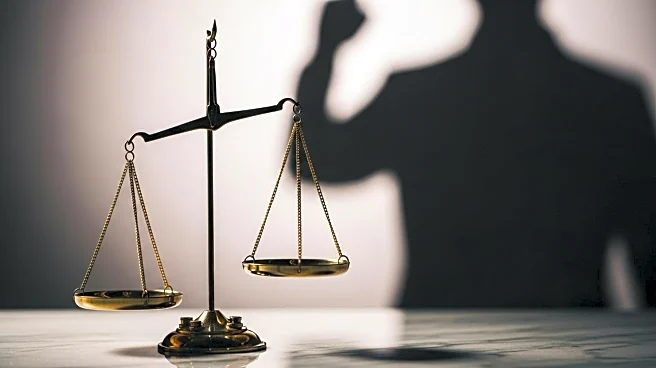What is the story about?
What's Happening?
Thousands of protesters gathered in Washington, D.C., to oppose President Trump's federal takeover of policing in the city. The demonstration, organized by local advocates and the American Civil Liberties Union, featured a march from Meridian Hill Park to Freedom Plaza. Protesters carried banners demanding an end to the occupation, which has seen National Guard troops and federal agents patrolling the streets for four weeks. The intervention was justified by Trump as a measure to address crime and homelessness, despite city officials noting a decrease in violent crime compared to his first term. The emergency declaration allowing federal control is set to expire soon.
Why It's Important?
The federal intervention in Washington, D.C., raises significant concerns about the balance of power between local and federal authorities. The presence of military officers has heightened tensions and sparked widespread protests, highlighting issues of democracy and representation for D.C. residents who lack federal representation. The situation underscores broader debates about federal authority and civil liberties, particularly in cities with Democratic leadership. The protests reflect a growing resistance to what some perceive as authoritarian measures by the Trump administration, with potential implications for other cities facing similar interventions.
What's Next?
The emergency declaration enabling federal control in Washington is set to expire soon, which may lead to changes in the policing strategy in the city. The Trump administration has also indicated plans to extend similar federal enforcement measures to other cities like Chicago, prompting reactions from local leaders. The ongoing protests and public opposition may influence future policy decisions and the administration's approach to crime and immigration enforcement in urban areas. Stakeholders, including local governments and civil rights organizations, are likely to continue advocating for the restoration of local control and democratic processes.
Beyond the Headlines
The intervention in Washington, D.C., highlights deeper issues related to the city's unique status and lack of representation in Congress. This situation brings attention to longstanding debates about D.C.'s autonomy and the push for statehood, which could alter the dynamics of federal intervention. The protests also reflect broader societal concerns about civil liberties and the role of federal authority in local governance, potentially influencing public discourse and policy on national security and civil rights.















